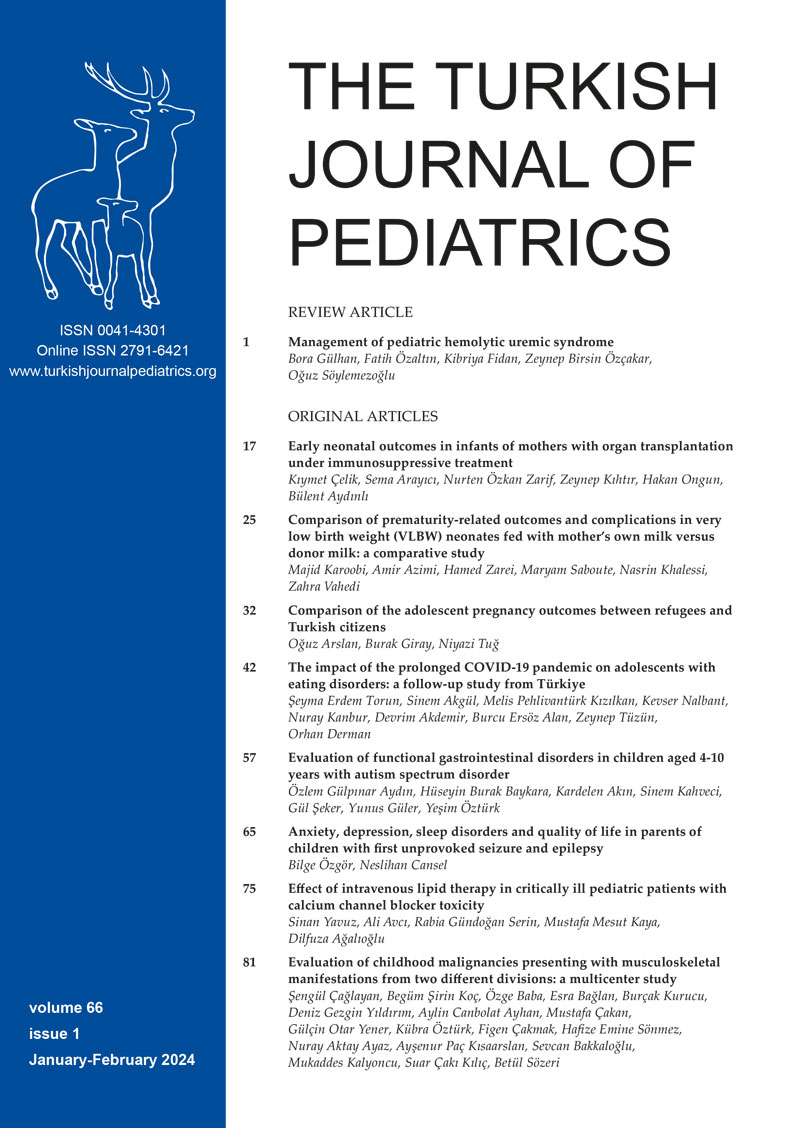Abstract
Background. When mother’s own milk (MOM) is unavailable or insufficient, donor milk (DM) from a human milk bank serves as an alternative feeding option. Our study sought to investigate and compare the outcomes and complications of very low birth weight (VLBW) preterm infants who receive MOM versus DM.
Methods. In this retrospective cohort study conducted between 2018 and 2022, we compared 70 VLBW preterm infants exclusively fed with DM to 70 randomly selected counterparts fed with MOM. Both groups began enteral feeding within 72 hours of birth. Various clinical outcomes were investigated during a three-month follow-up. The clinical outcomes were compared via independent t-tests, Mann-Whitney U, and Fisher’s exact test.
Results. The mean gestational age of the infants who were included was 29.6 ± 1.6 weeks, 84 (60%) were males, and the average birth weight was 1217 ± 151 grams. Both groups had similar baseline characteristics. The results of the study demonstrated no statistically significant differences between the groups in terms of hospital length of stay (37±16.3 days in MOM vs 40.3±16.9 days in DM group, P= 0.17), growth rate (13±4 gram/day in MOM vs 13±4 gram/day in DM group, P=0.51), growth velocity (9.8±3.0g/kg/d in MOM vs 9.5±3.2 g/kg/d in DM group), infants with in-hospital vomiting (51 cases in MOM vs 59 cases in DM group, P=0.15),vomiting frequency (1.3±1.1 times in MOM vs 1.5±1.0 times in DM group), incidence of retinopathy of prematurity (ROP) (4 cases in MOM vs 5 cases in DM group, P>0.999) and incidence of bronchopulmonary dysplasia (BPD) (7 cases in MOM vs 6 cases in DM group, P>0.999).
Conclusion. Our study findings indicate that the utilization of DM didn’t have a substantial negative impact on infants’ outcomes nor any complications in comparison with MOM.
Keywords: mother’s own milk, donor milk, very low birth weight, preterm infants
References
- Armanian AM, Barekatain B, Sohrabi F, Salehimehr N, Mansourian M. The prevalence of complications of prematurity among 1000 newborns in Isfahan, Iran. Adv Biomed Res 2019; 8: 12. https://doi.org/10.4103/abr.abr_84_18
- Stark A, Dammann C, Nielsen HC, Volpe MV. A Pathogenic Relationship of bronchopulmonary dysplasia and retinopathy of prematurity? A review of angiogenic mediators in both diseases. Front Pediatr 2018; 6: 125. https://doi.org/10.3389/fped.2018.00125
- Hay WW. Aggressive nutrition of the preterm infant. Curr Pediatr Rep 2013; 1: 229–239. https://doi.org/10.1007/s40124-013-0026-4
- Cutland CL, Lackritz EM, Mallett-Moore T, et al. Low birth weight: Case definition & guidelines for data collection, analysis, and presentation of maternal immunization safety data. Vaccine 2017; 35: 6492-6500. https://doi.org/10.1016/j.vaccine.2017.01.049
- Moro GE, Arslanoglu S. Editorial: human milk in the feeding of preterm infants: established and debated aspects. Front Pediatr 2020; 8: 378. https://doi.org/10.3389/fped.2020.00378
- Bertino E, Di Nicola P, Giuliani F, et al. Benefits of human milk in preterm infant feeding. J Pediatr Neonat Individual Med 2012; 1: 19-24. https://doi.org/10.7363/010102
- Ford SL, Lohmann P, Preidis GA, et al. Improved feeding tolerance and growth are linked to increased gut microbial community diversity in very-low-birth-weight infants fed mother’s own milk compared with donor breast milk. Am J Clin Nutr 2019; 109: 1088-1097. https://doi.org/10.1093/ajcn/nqz006
- Bell MJ, Ternberg JL, Feigin RD, et al. Neonatal necrotizing enterocolitis. Therapeutic decisions based upon clinical staging. Ann Surg 1978; 187: 1-7. https://doi.org/10.1097/00000658-197801000-00001
- Simon L, Hanf M, Frondas-Chauty A, et al. Neonatal growth velocity of preterm infants: the weight Z-score change versus Patel exponential model. PLoS One 2019; 14: e0218746. https://doi.org/10.1371/journal.pone.0218746
- Richardson DK, Corcoran JD, Escobar GJ, Lee SK. SNAP-II and SNAPPE-II: simplified newborn illness severity and mortality risk scores. J Pediatr 2001; 138: 92-100. https://doi.org/10.1067/mpd.2001.109608
- Sun H, Han S, Cheng R, Hei M, Kakulas F, Lee SK. Testing the feasibility and safety of feeding preterm infants fresh mother’s own milk in the NICU: a pilot study. Sci Rep 2019; 9: 941. https://doi.org/10.1038/s41598-018-37111-7
- Badiee Z, Samsamshariat S, Pormorshed P. Effect of massage on weight gain in premature infants. Iranian Journal of Neonatology 2012; 3: 57-62. https://doi.org/10.22038/ijn.2012.267
- Arzani A, Mohammad Khan Kermanshahi S, ZahedPasha Y. Role of discharge planning for mothers on growth and developmental indicators in LBW newborns. Journal of Babol University of Medical Sciences 2005; 7: 58-63.
- Kumbhare SV, Jones WD, Fast S, et al. Source of human milk (mother or donor) is more important than fortifier type (human or bovine) in shaping the preterm infant microbiome. Cell Rep Med 2022; 3: 100712. https://doi.org/10.1016/j.xcrm.2022.100712
- Lund AM, Domellöf M, Pivodic A, Hellström A, Stoltz Sjöström E, Hansen-Pupp I. Mother’s own milk and its relationship to growth and morbidity in a population-based cohort of extremely preterm infants. J Pediatr Gastroenterol Nutr 2022; 74: 292-300. https://doi.org/10.1097/MPG.0000000000003352
- Montjaux-Régis N, Cristini C, Arnaud C, Glorieux I, Vanpee M, Casper C. Improved growth of preterm infants receiving mother’s own raw milk compared with pasteurized donor milk. Acta Paediatr 2011; 100: 1548-1554. https://doi.org/10.1111/j.1651-2227.2011.02389.x
- Alizadeh M, Mehrabi E, Mostafa Gharehbaghi M, et al. Mother’s own milk versus donor human milk: effects on growth and outcomes in preterm neonates. J Pediatr Neonat Individual Med 2023; 12: e120122. https://doi.org/10.7363/120122
- Cossey V, Vanhole C, Eerdekens A, Rayyan M, Fieuws S, Schuermans A. Pasteurization of mother’s own milk for preterm infants does not reduce the incidence of late-onset sepsis. Neonatology 2013; 103: 170-176. https://doi.org/10.1159/000345419
- Suganuma M, Rumbold AR, Miller J, Chong YF, Collins CT. A systematic review and meta-analysis of human milk feeding and short-term growth in preterm and very low birth weight infants. Nutrients 2021; 13: 2089. https://doi.org/10.3390/nu13062089
- Villamor-Martínez E, Pierro M, Cavallaro G, Mosca F, Kramer BW, Villamor E. Donor human milk protects against bronchopulmonary dysplasia: a systematic review and meta-analysis. Nutrients 2018; 10: 238. https://doi.org/10.3390/nu10020238
Copyright and license
Copyright © 2024 The Author(s). This is an open access article distributed under the Creative Commons Attribution License (CC BY), which permits unrestricted use, distribution, and reproduction in any medium or format, provided the original work is properly cited.















